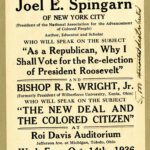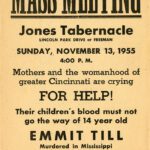
The following day, Congressman Adam Clayton Powell, Jr., a United States Representative from New York, sent a message from Germany praising the Act’s passage. Powell, one of only three African American congressional representatives in 1957, was known for his fiery rhetoric supporting civil rights legislation. Although a Democrat, he split with his party in 1956 and supported Dwight Eisenhower for president, declaring that he was a more outstanding supporter of civil rights than the Democratic candidate, Adlai Stevenson.
In his message to Congress, Powell praises Eisenhower for coming through on his promise to pass civil rights legislation. In addition to Eisenhower, he commends fellow New York Representative Emanuel Celler for his leadership in supporting the Act. Powell also calls on African Americans to use the Act to push for further civil rights legislation. He supports Martin Luther King, Jr.’s voting registration drive in the South. He calls on African Americans in the North to use their political power to support candidates who are friendly to civil rights, regardless of political party.
New Jersey Student Learning Standards:
- 6.1.12.CivicsDP.13.a: Analyze the effectiveness of national legislation, policies, and Supreme Court decisions in promoting civil liberties and equal opportunities (i.e., the Civil Rights Act, the Voting Rights Act, the Equal Rights Amendment, Title VII, Title IX, Affirmative Action, Brown v. Board of Education, and Roe v. Wade.
- 6.1.12.HistoryCC.13.c: Determine the impetus for the Civil Rights Movement and generate an evidence-based argument that evaluates the federal actions taken to ensure civil rights for African Americans.
Curriculum
- 3 Sections
- 3 Lessons
- Lifetime
- Stage 11
- Stage 21
- Stage 31
Lesson Materials:
| Name | Type |
|---|






















